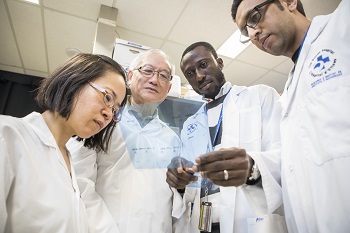 New research shows that a blood protein called plasma gelsolin (pGSN) could help predict which hospitalized COVID-19 patients are likely to become severely ill and die.New research led by Dr. Benjamin Tsang and Taggart-Parkes postdoctoral fellow Dr. Meshach Asare-Werehene shows that a blood protein called plasma gelsolin (pGSN) could help predict which hospitalized COVID-19 patients are likely to become severely ill and die.
New research shows that a blood protein called plasma gelsolin (pGSN) could help predict which hospitalized COVID-19 patients are likely to become severely ill and die.New research led by Dr. Benjamin Tsang and Taggart-Parkes postdoctoral fellow Dr. Meshach Asare-Werehene shows that a blood protein called plasma gelsolin (pGSN) could help predict which hospitalized COVID-19 patients are likely to become severely ill and die.
Their new study, published in Frontiers in Immunology, looked at pGSN along with standard blood biomarkers, cytokines and antibodies in COVID-19 patients at The Ottawa Hospital over time, and compared these with volunteers without COVID-19. They found that pGSN, together with COVID-19 antibodies, strongly predicted COVID-19 severity and death while pGSN, together with IL-6, significantly predicted milder disease.
The researchers note that if the results are validated in larger studies, these biomarkers could help with difficult treatment decisions, especially when hospital resources are strained.
Authors: Asare-Werehene M, McGuinty M, Vranjkovic A, Galipeau Y, Cowan J, Cameron B, Cooper CL, Langlois MA, Crawley AM, Tsang BK.
Core resources: Clinical Research Laboratory, Coronavirus Variants Rapid Response Network–Biobank
Funding: The Ottawa Hospital Department of Medicine - Special Pandemic Agile Research Competition
The Ottawa Hospital is a leading academic health, research and learning hospital proudly affiliated with the University of Ottawa and supported by The Ottawa Hospital Foundation.
